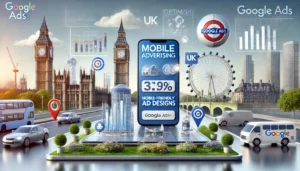Google Ads Trends to Watch for UK Businesses in 2024 and Beyond

As we are in the midst of 2024, Google Ads is changing faster than ever. For UK businesses, keeping up with these changes is key to staying competitive. This article will explore the latest Google Ads trends you need to know to future-proof your campaigns.
Key Takeaways
- AI is transforming Google Ads with features like better targeting and ad copy generation.
- Automation tools are making campaign management easier and more efficient.
- Broad match targeting is becoming more important for reaching wider audiences.
Google Ads Trends to Watch for UK Businesses in 2024 and Beyond: AI-Powered Features
Leveraging Machine Learning for Better Targeting
The advent of AI in Google Ads has changed the way we manage and optimise campaigns. With machine learning, we can now target audiences more precisely than ever before. This technology analyses vast amounts of data to identify patterns and trends, allowing us to reach the right people at the right time. London PPC agencies are already leveraging these capabilities to deliver more effective campaigns.
AI-Driven Ad Copy Generation (Google Ads Trends to Watch for UK Businesses in 2024 and Beyond)
Creating compelling ad copy can be time-consuming, but AI is here to help. AI-driven tools can generate ad copy that resonates with your target audience, saving you time and effort. These tools use natural language processing to craft messages that are not only relevant but also engaging. This means we can focus more on strategy and less on the nitty-gritty of writing.
Predictive Analytics for Campaign Optimisation
Predictive analytics is another game-changer. By analysing past performance and current trends, AI can predict future outcomes and suggest optimisations. This proactive approach allows us to stay ahead of the curve and make data-driven decisions. Predictive analytics helps us anticipate market changes and adjust our strategies accordingly, ensuring our campaigns are always performing at their best.
The integration of AI in Google Ads is not just a trend; it’s a revolution. As we continue to embrace these technologies, we can expect even greater efficiencies and results in our campaigns.
Google Ads Trends to Watch for UK Businesses in 2024 and Beyond: The Rise of Automation
Automation is transforming the way we manage Google Ads PPC campaigns. With the rise of smart bidding strategies, automated ad extensions, and streamlined campaign management, businesses can now achieve better results with less manual effort. Automation tools are not just about saving time; they also enhance the effectiveness of our campaigns. Let’s explore how these advancements are shaping the future of Google Ads.
Smart Bidding Strategies
Smart bidding strategies, such as Target CPA (Cost Per Acquisition) and ROAS (Return on Ad Spend), are becoming essential for successful campaigns. These strategies leverage AI to optimise bids in real-time, ensuring that we get the best possible outcomes. By using smart bidding, we can focus on other aspects of our campaigns while the system handles the complex calculations.
Automated Ad Extensions (Google Ads Trends to Watch for UK Businesses in 2024 and Beyond)
Automated ad extensions are another game-changer. These extensions automatically add relevant information to our ads, such as site links, callouts, and structured snippets. This not only improves the visibility of our ads but also enhances their performance. With automated ad extensions, we can provide more value to our audience without the need for constant manual updates.
Streamlining Campaign Management
Managing multiple campaigns can be overwhelming, but automation tools simplify this process. From automated rules to performance insights, these tools help us stay on top of our campaigns with ease. We can set up rules to adjust bids, pause underperforming ads, and even schedule our ads to run at optimal times. This level of control allows us to focus on strategy rather than getting bogged down in the details.
As Google ads agencies, we must embrace these automation trends to stay competitive. A thorough Google ads audit or PPC audit can help identify areas where automation can make a significant impact. By leveraging these tools, we can ensure our Google AdWords PPC campaigns are not only efficient but also highly effective.
Google Ads Trends to Watch for UK Businesses in 2024 and Beyond: Broad Match Targeting – A New Focus
Understanding Broad Match
In the ever-changing world of digital advertising, Google has shifted its focus towards broad match keywords in its Ads platform. This change is driven by growing trust in smart bidding and AI’s ability to learn and improve targeting over time. Broad match keywords help brands reach a wider audience and reduce the need for manual keyword work. While broad match has been around since Google Ads started, it has evolved significantly thanks to advances in AI. Today’s broad match can understand search queries on a deeper level, making it a powerful tool for search ads.
Benefits of Broad Match Targeting (Google Ads Trends to Watch for UK Businesses in 2024 and Beyond)
Broad match targeting offers several advantages. First, it allows us to reach a larger audience by capturing a wide range of search queries. This can lead to more impressions and clicks, increasing the chances of finding potential customers. Second, broad match keywords can save time and effort by reducing the need for extensive keyword research and management. Finally, with the help of AI and smart bidding, broad match can optimise performance over time, ensuring that our ads are shown to the most relevant audience.
Best Practises for Implementation
To make the most of broad match targeting, we should follow some best practises. First, it’s important to use broad match keywords in combination with smart bidding strategies. This allows the AI to learn and optimise for the best results. Second, we should regularly review and update our keyword list to ensure it remains relevant and effective. Third, it’s crucial to monitor performance and make adjustments as needed. By following these best practises, we can maximise the benefits of broad match targeting and achieve our advertising goals.
Broad match targeting is a powerful tool that can help us reach a wider audience and improve our ad performance. By leveraging AI and smart bidding, we can optimise our campaigns and achieve better results over time.
Google Ads Trends to Watch for UK Businesses in 2024 and Beyond: Mobile Advertising Trends
Optimising for Mobile Devices
With the rise of smartphones and fast internet, more people are using their mobile devices. This means businesses need to make sure their ads work well on mobile. Mobile ad spending is expected to reach nearly £311.3 billion by 2024. To make your ads mobile-friendly, follow these tips:
- Use clear and simple designs
- Make sure your website loads quickly
- Test your ads on different devices
Location-Based Targeting (Google Ads Trends to Watch for UK Businesses in 2024 and Beyond)
Location-based targeting helps us reach people in specific areas. This is great for local businesses. By using GPS and other tools, we can show ads to people near our stores. This makes our ads more relevant and can lead to more sales.
Mobile-Friendly Ad Formats
It’s important to use ad formats that look good on mobile devices. Some popular formats include:
- Responsive ads
- Carousel ads
These formats help us engage users better and improve our ad performance.
Mobile advertising is growing fast. We need to stay updated with the latest trends to make the most of our campaigns.
Google Ads Trends to Watch for UK Businesses in 2024 and Beyond: The Importance of Micro Conversions
Identifying Micro Conversions
Micro conversions are the small actions users take on their way to a larger goal, like a sale. These can include adding items to a cart, signing up for newsletters, or downloading resources. While they might not lead to an immediate sale, they are crucial steps in the customer journey.
Tracking and Measuring Micro Conversions (Google Ads Trends to Watch for UK Businesses in 2024 and Beyond)
To understand how users move through the conversion process, we need to track these micro conversions. This data helps us see what interests our audience and what drives them to make purchases. Ignoring these small steps means missing out on valuable insights.
Incorporating Micro Conversions into Strategy
We should not overlook micro conversions. They help us optimise every step of the customer journey. By focusing on these actions, we can improve our overall strategy and ensure no user is left behind, even if they only perform a micro-conversion activity.
Paying attention to micro conversions can make a big difference in understanding and improving the customer journey.
Maximising ROI with Smart Budgeting
Allocating Budget Effectively
To get the most out of our PPC management, we need to allocate our budget wisely. Start small and iterate. Begin with a manageable budget and adjust based on campaign performance. This approach helps us understand what works best without overspending. Tracking and analysing data is crucial. Monitor clicks, conversions, and costs to optimise our campaigns and maximise value.
Using Data to Inform Budget Decisions
Data-driven decisions are at the heart of effective budgeting. By leveraging machine learning, we can analyse vast datasets to tailor strategies that are both responsive and proactive. This means our budget is always working hard for us. Consider a combined approach: integrating PPC with organic SEO can lead to long-term growth. This strategy ensures we are not putting all our eggs in one basket.
Balancing Spend Across Campaigns
Balancing our spend across different campaigns is essential. We should focus on campaigns that drive the highest ROI. This might mean shifting budget from underperforming campaigns to those that are more successful. Using smart bidding strategies, we can maximise budget efficiency, enabling us to compete with larger players in the PPC space.
Remember, the key to smart budgeting is flexibility. We must be ready to adjust our strategies based on performance data to ensure we are always getting the best return on our investment.
The Growth of App Advertising
Creating Effective App Ads
In today’s digital age, app advertising has become a crucial part of our marketing strategies. With the rise of smartphones and high-speed internet, more people are spending time on their mobile devices. This shift has led to an increase in app advertising as businesses aim to reach their audience where they are most active. Creating effective app ads involves understanding your audience, crafting engaging content, and utilising the right platforms to reach potential users.
Targeting App Users
Targeting the right users is essential for the success of app advertising campaigns. We need to focus on users who are most likely to engage with our app and become loyal customers. This can be achieved through various targeting options such as demographics, interests, and behaviours. By leveraging data and analytics, we can refine our targeting strategies and ensure our ads are reaching the right audience.
Measuring App Ad Performance
Measuring the performance of app ads is vital to understand their effectiveness and make necessary adjustments. Key metrics to track include click-through rates, conversion rates, and user engagement. By analysing these metrics, we can identify what works and what doesn’t, allowing us to optimise our campaigns for better results. Additionally, conducting controlled experiments can help measure the incremental ROI of our app advertising spend, providing valuable insights for future campaigns.
App advertising is not just about reaching a large audience; it’s about reaching the right audience with the right message. By focusing on creating effective ads, targeting the right users, and measuring performance, we can maximise the impact of our app advertising efforts.
Adapting to Privacy Changes in Advertising
Understanding Privacy Regulations
Navigating the ever-changing landscape of digital advertising requires us to stay updated on privacy regulations. With laws like GDPR and CCPA, we must prioritise user privacy while maintaining effective ad strategies. These regulations demand a shift in how we collect and use data, pushing us to find new ways to reach our audience without compromising their trust.
Adapting Strategies for Compliance
To comply with these privacy laws, we need to rethink our approach. This means moving away from third-party cookies and embracing first-party data. We should also consider using tools like Google’s Privacy Sandbox, which aims to keep ads effective without relying on third-party cookies. Here are some steps to adapt:
- Audit current data practises to ensure compliance.
- Invest in first-party data collection methods.
- Utilise privacy-focused tools like Privacy Sandbox.
- Educate our team on the importance of privacy.
Maintaining Effective Targeting Amidst Changes
Even with these changes, we can still target our ads effectively. By leveraging first-party data and predictive analytics, we can create personalised and engaging ads. It’s also crucial to stay flexible and adapt to new tools and technologies as they emerge. Balancing privacy and effectiveness will be key to our success in this new era of digital advertising.
Embracing these changes not only helps us comply with regulations but also builds trust with our audience, ensuring long-term success.
As privacy rules change, it’s important for advertisers to adapt. These changes can be tricky, but they also offer new chances to connect with your audience in better ways. Want to stay ahead in the game? Visit our website for a free PPC audit and see how we can help you improve your ad performance.
Conclusion
As we look ahead to 2024 and beyond, it’s clear that Google Ads will continue to evolve, bringing new opportunities and challenges for UK businesses. By staying informed about the latest trends, such as AI-powered tools, automation, and the rise of mobile advertising, you can ensure your campaigns remain effective and competitive. Embrace these changes, experiment with new strategies, and always be ready to adapt. Doing so will help you future-proof your campaigns and achieve lasting success in the ever-changing digital landscape.
Frequently Asked Questions
What are the key trends predicted for Google Ads in 2024 and beyond?
The main trends for Google Ads in 2024 include more AI-powered features, a bigger focus on automation and smart bidding, and broad match targeting.
How can Google Ads benefit businesses in 2024?
In 2024, Google Ads can help businesses by using advanced AI features and better targeting.
What is broad match targeting?
Broad match targeting is a way to show your ads to a wider audience by matching your keywords with related searches, even if they don’t exactly match your keywords.
How can businesses optimise their Google Ads for mobile devices?
Businesses can optimise their Google Ads for mobile by making sure their ads are mobile-friendly, using location-based targeting, and choosing ad formats that look good on mobile devices.
What are micro conversions and why are they important?
Micro conversions are small actions that users take on your site, like signing up for a newsletter. They are important because they can lead to bigger conversions, like making a purchase.
How can businesses adapt to privacy changes in advertising?
Businesses can adapt to privacy changes by understanding new regulations, updating their strategies to stay compliant, and finding new ways to target their audience effectively.
What are the benefits of using AI-powered features in Google Ads?
AI-powered features can help businesses by improving targeting, creating better ad copy, and using predictive analytics to optimise campaigns for better results.
Author
Search Blog
Free PPC Audit
Subscribe to our Newsletter
The Voices of Our Success: Your Words, Our Pride
Don't just take our word for it. With over 100+ five-star reviews, we let our work-and our satisfied clients-speak for us.
"We have been working with PPC Geeks for around 6 months and have found Mark and the team to be very impressive. Having worked with a few companies in this and similar sectors, I rate PPC Geeks as the strongest I have come across. They have taken time to understand our business, our market and competitors and supported us to devise a strategy to generate business. I value the expertise Mark and his team provide and trust them to make the best recommendations for the long-term."
~ Just Go, Alasdair Anderson




